R. Mark Liebenow's Blog: Nature, Grief, and Laughter, page 7
April 17, 2016
Land Prophets
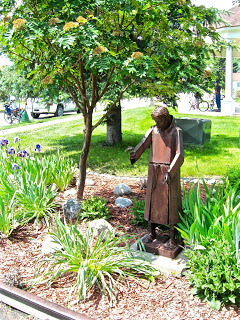
This month, as April encourages us to linger outdoors and play, we honor the death of Rachel Carson on the 14th, remember the birth of John Muir on the 21st and celebrate Earth Day on the 22nd.
*
The Land Prophets dedicate their lives to showing others how to do less damage to the land. They confront people in politics and businesses who exploit the land only to make money, who listen to special interest groups rather than the everyday people they represent, and who betray the public trust as trustees of the land. These are some of our prophets.
In California, John Muir saw sheep destroying the wilderness meadows of the Sierra Nevada and worked to get them removed. In the process, he helped create the Sierra Club and the National Park system that has saved large tracts of wilderness areas. He also wanted to save Hetch Hetchy, but the politicians in San Francisco sold nature out for votes.
Aldo Leopoldsaw the barren land in Sand County, Wisconsin, and figured out a way to restore the habitat. His efforts and writings kick-started the ecology movement.
Destruction of the land stops only when people speak up.
Kathleen Dean Moore writes about the interplay of land and ocean in Oregon, and human renewal through the spirituality of being outdoors.
Sigurd Olsonworked to save the Boundary Waters in northern Minnesota, and taught the value of listening to nature’s wildness.
Terry Tempest Williams in Utah writes of the radioactive desecration of land in the west and its toll on human health, and she is leading a movement of healing the land.
Wendell Berryin Kentucky is figuring out how to do sustainable farming, feeding people while doing minimal damage to the land, helping the earth remain a habitat for animals and birds while feeding people for decades to come.
Sharman Apt Russell writes of the living environment in the desert wilderness of southwest New Mexico, where many of us think not much life lives, and reminding us that what seems barren sustains a wide variety of life.
John Burroughsin New York wanted people to love the nature that existed around us, even in the city, because then they would take care of it.
Francis and Clare of Assisi loved nature, and felt that we were brothers and sisters to all creatures. Rather than fear the outdoors, they encourage us to participate in its life and care for it.
Stepping into the unknown involves taking risks because we don’t know where we’ll end up, or who will object and fight us. But the experiences of the land prophets who have gone before us tell us that standing up for nature is the only way that the natural world will be saved.
Published on April 17, 2016 05:29
April 10, 2016
We Are Trees
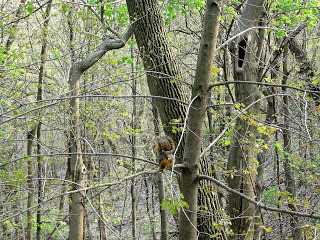 Tiny buds on the trees are giving the woods behind my house a light green sheen.
Tiny buds on the trees are giving the woods behind my house a light green sheen.Last week I noticed a beautiful bare tree. Without any leaves, its entire structure was visible —the trunk, main branches, even the smaller branches as they tapered out into thousands of tiny fingers. The tree was so symmetrical that I gazed at it in admiration, and then I had to leave because I was in a car at a stoplight.
We are like trees.
We grow out from where we’ve been.
The root systems of many trees are a mirror image of what we see in their branches. The half of the tree that branches underground provides nourishment, while the top half we see does something.
Trees are half contemplation, half action.
A few days ago I went into the woods and found a favorite tree that did not survive the winter. The bark on my old friend was beginning to come off in places. I’ve enjoyed the beauty of this tree over the years, and sat under it when it was full and glorious in its summer green. In blustery thunderstorms, I’ve watched it sway back and forth in the wind.
When we sit in a forest and watch the trees, we nourish our roots.
A hole in the trunk of another tree has become a new home for squirrels. I think the trunk might be hollow. Soon its branches will let go under their own weight, and the tree will fall. Then it will become a home for insects and grubs, and attract a new set of birds. Its body will be reabsorbed into the earth and nurture the next generation.
Some trees have significance larger than our personal delight, like the cedars of Lebanon, the giant sequoias of Yosemite, the Bodhi Tree of Buddha, and the Glastonbury Thorn.
When any noble tree dies, I mourn its passing.
Published on April 10, 2016 06:41
April 3, 2016
Send Them Outside to Play
 If you have no relationship with nature, you have no relationship with humanity.
If you have no relationship with nature, you have no relationship with humanity.-- Krishnamurti
The landscape of one’s home is always sacramental. It molds our character. It’s the soil out of which we grow. It’s where we either encounter the divine or we never make the connection.
-- Seamus Heaney
If we have a relationship with nature, we do better in relationships with people because we realize that there are bigger truths than our own personal ones, and we can learn from nature. Nature has a way of humbling us, and reminding us that we’re not in control outdoors. In nature we become aware of a greater force at work in the world.
If we have a relationship with nature, we will care what happens to the environment. We will notice when our favorite river becomes polluted, or when our favorite woods are being cut down for a subdivision. We will notice because we will be outside and we will see the destruction. And we can stop some of the destruction if we say something.
If we don’t connect to nature, we will regard the forest only as a source of wood for building homes. We will think of the river only as a place for factories to dump their waste water. We won’t care about pesticides running off the land and into our lakes, killing the fish and making the water undrinkable. Unless we have a beloved fishing hole, or a favorite river that we like to canoe, we won’t care because we won’t have any personal investment.
Large businesses care little about the environment. They increasingly exist only to make as much money as fast as they can for their shareholders. Large businesses have large PR teams that create rosy pictures to make us think they care. They don’t. They really don’t.
If we don’t connect to nature, if we don’t come to love the woods and rivers and mountains, if we don’t feel we are part of nature’s community of living creatures, then we will exploit the land, and we will exploit each other. Everything becomes a commodity if we love nothing but money. If we don’t care about the welfare of others, then we exist only for ourselves, and that is sad.
We will drink artificial water, and eat tasteless, plastic food. We will be depressed by the lack of natural beauty outside our windows because it’s all been bulldozed flat. And when we die, we will be alone, closed up in a hermetically-sealed room because the air smells bad.
Send your children outdoors to play so that they will grow up loving the land and care what happens to it. Go outside yourself before you become crusty, bitter, and bent over like an old curmudgeon money pocket. Breathe in the fresh air of the mountains and feel yourself come alive. Then you will understand what is at stake.
Published on April 03, 2016 05:30
April 1, 2016
Listen to the Dawn
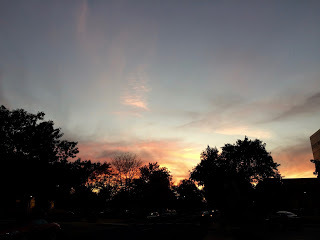 On Nourishment
On Nourishment Listening To The Dawn.A short essay of mine published by Mindful Matter.
http://www.holstee.com/blogs/mindful-matter/113326533-meditation-listen-to-the-dawn
Published on April 01, 2016 11:29
March 27, 2016
Sitting In the Woods
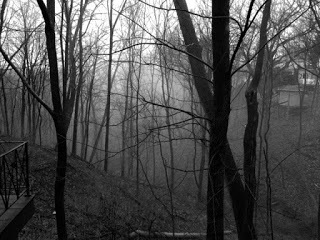 I’m in the woods again.
I’m in the woods again.Winter has departed but the green of spring hasn’t yet arrived. The woods are just sitting here. Waiting. Black trees sticking out of a layer of brown leaves.
Not much is going on. The woodchuck is still hibernating. The deer haven’t come through in quite a while. The birds stopped coming to the feeder and are foraging somewhere else. And don’t get me started on the owl that’s been on vacation for six months. Everyday the woods look the same, although today fog is drifting through.
I like to be there in the time after because of the presence I feel sitting on a wooden pew in the dusk of that cavernous space. Red votives flicker up front. Stone pillars rise around me. Stained glass windows on the side glow deep blue in the last light of day.
This is what we have after the celebration ends. Memories. And hope.
I am not much for parades and grand celebrations. I’m more interested in the people standing in doorways after the parade has passed by. This is where most of us live. On the edges of life. Battered, bruised, broken, yet believing there is a way through the darkness. Living the days of ordinary time when there are no parades.
I like to sit in the forest on a wooden log and be surrounded by trees rising above me, by something greater than myself, something mysterious and powerful. Real.
In the woods, in cathedrals, and when I listen to people share the struggles and triumphs of their lives, I feel the movement of the sacred. Into this darkness, the morning's light is coming.
May I linger in the wild, unkempt places that remind me life is deeper than what I see.
As I walk the road with strangers, may we share our lives with each other in honest humility.
Published on March 27, 2016 06:03
March 20, 2016
Cadence of Silence
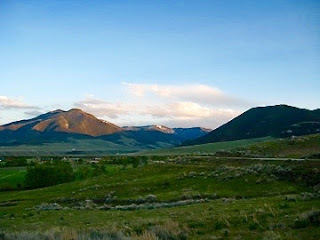 It’s odd we don’t think it’s odd that we regard silence as deficient and not as full.
It’s odd we don’t think it’s odd that we regard silence as deficient and not as full. We fill the air with talk, music, sports, news and weather updates until we fall exhausted into bed, the sounds of the day still ringing in our heads. Yet we feel unsatisfied because we’ve heard little that we want to remember. We feel empty. In the manner of the Quakers, we should remain silent until we have something important to say.
We need to sit in a quiet place to know what’s on our minds and hearts.
We need to let go of our preoccupations. Stop thinking about the future and let go of the past. Each day we need time to exist just in this moment. Find out what concerns are troubling us. We need to step back and laugh at some of the things we obsess about that don’t matter, and let them go. We are amazing as we are.
But we don’t. If we are tired, we put on happy music to charge us up, or open an energy drink, instead of dealing with why we feel tired. Music becomes another drug we take to cope with reality.
The sounds of the city shoulder each other out of the way as they fight to get our attention. The billboards. Commercials. The political ads. Their shouting escalates into a din, and teaches us not to listen to what’s going on around us.
When I listen to the natural world, I hear the cadence of silence.
Sometimes when I’m chatting with friends, it’s like being on a train. A word is said that draws my attention to something on the side of our conversation, outside the window, but the train of conversation keeps going straight ahead, and the opening to something deeper slips away.
It can be unsettling to be home without the sounds of the TV, radio, or music filling the rooms. We hear the sounds of the house — the refrigerator clicking on, the roof creaking in the wind, a strange hum that comes from an unknown place, and we wonder if something is about to blow up. We realize how seldom we just sit and listen to the environment around us.
One of the reasons I go camping is to give my ears a chance to rest.
It takes a couple of days after I arrive outdoors before I can hear nature’s softer voices. It also takes time for the surface chatter in my head to quiet. Sitting on the side of a mountain listening to the wind move over the land, I begin to hear the thoughts and feelings that are moving underneath my surface.
At night, I walk into the meadow and drink in the quiet of the dark. I sip the silence of the stars like wine.
Published on March 20, 2016 06:04
March 13, 2016
Old Trees and Landscapes
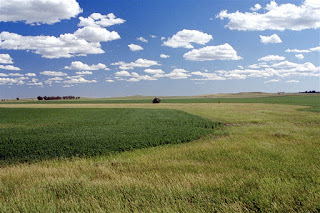 There’s a street near my house that had a small woods of majestic, large trees hanging over the road. It provided cool shade even on the hottest summer day. Some trees were perhaps one hundred years old. For one block it felt like walking through Sherwood Forest with its thick trunks and dense canopy.
There’s a street near my house that had a small woods of majestic, large trees hanging over the road. It provided cool shade even on the hottest summer day. Some trees were perhaps one hundred years old. For one block it felt like walking through Sherwood Forest with its thick trunks and dense canopy.It used to be a space that made me linger and encouraged me to breathe deeply and get my bearings as I headed off to begin my day. That small woods made me happy.
The land we live on influences how we relate to other people and the care we take in our work.
A green landscape makes me feel connected to something alive. It nourishes me and encourages me to pass its peacefulness on to others.
Thankfully there are other places in town. When I stand on the bluffs of Grandview Drive, I’m inspired by the view high above the Illinois River and over miles of land that used to be prairie. If I squint, I can see the old grasslands and bison that used to roam free.
When I sit along the river and watch it flow by, I feel the massive power of the water as it surges on to the Mississippi River and the Gulf of Mexico a thousand miles away.
I drive into the countryside to see the gentle roll of the land, like long flowing waves way out on the ocean. The land has a close relationship with the sky, like cousins. Soon the green shoots of wheat, oats, and corn will appear and block my view of tree-lined creeks and the horizon.
On the way out, I went by a new shopping mall built where there used to be a patch of old prairie. Instead of seeing wildlife run through the grass, now there were scraps of discarded plastic bags. Instead of hearing birds chirp, there was the sound of hollow paper cups tumbling across dry asphalt.
Too often, developers flatten habitats and landscapes and move on, leaving dead earth and hard-shelled structures behind that push us further away from ourselves.
Nature creates new landscapes of beauty out of the old that draw us in.
As much as we deny it, we need the land to keep us human.
Published on March 13, 2016 07:50
March 6, 2016
Being Spiritual Outdoors
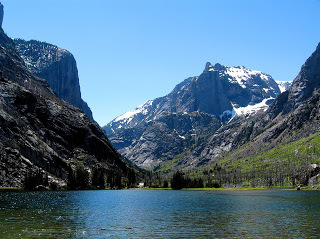 When people talk about spirituality, a number of standard terms are used that have different meanings for different people. We have our own preferences, of course. Some terms we bristle at, because of bad experiences in the past, while others we cozy up to like old friends. Each term covers a huge amount of territory with many nuances.
When people talk about spirituality, a number of standard terms are used that have different meanings for different people. We have our own preferences, of course. Some terms we bristle at, because of bad experiences in the past, while others we cozy up to like old friends. Each term covers a huge amount of territory with many nuances. In regards to what we actually mean, we also use many of the terms interchangeably. So don’t get hung up on a term. What we are seeking is connection to the deeper reality, a numinous experience. Substitute the term that has meaning for you.
*
Mindfulnessis camping in the wilderness, rising at dawn, and listening to the air, the trees, and the birds wake up as we cook breakfast over a fire.
Prayer is a conversation we have with the mountains and rivers, with the ravens and coyotes. We open ourselves to nature, and listen for the presence of the Other in the landscape. As we do, our perceptions about ourselves and the world deepen. We watch the everyday life of the outdoors, and grow in compassionfor all creatures.
Awareness is an adventure. On the trail, we don’t know what we will find around the next bend. We might encounter a a mountain lion or a mother bear with her cubs, and need to quietly, and slowly, back away. The trail may also take us to a stunning view over a river canyon that leaves us slack-jawed with awe.
Insights of contemplation come like the touch of a cool breeze on our forehead on a hot day when we’re hiking up the steep ridge behind North Dome at 8400 feet.
Awe is feeling the Creator walk by in a massive rainstorm that sweeps through the valley with rumbling thunder and flashes of lightning.
As we hike into unknown territory, we trust the Spirit to guide us where we need to go. We travel with holy intention on a search that may take years, yet we are mindful that this beauty is not our destination. And yet, we know that in this moment there is this beauty, and it is to be taken in and celebrated.
Mindfulnessis a journey; it’s also our companion along the way.
Prayer is being aware of the pine seedling rising through the humus on the ground.
Gratefulnessis watching the alpenglow on white granite mountains deepen from red to purple, stars appear that travel overhead, and being thankful for our pilgrimage through the depths of the Cosmos, for being part of what will be and what has been.
Published on March 06, 2016 05:44
February 28, 2016
Sequoias
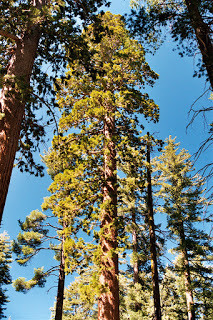
(from a visit a few years ago)
Leaving my car at the entrance of the Mariposa Grove of giant sequoias, I walk slowly through the deep snow and let the silence of the grove wrap around me, moving from one giant tree to the next. I place my hand on the thick red bark of one and feel its endurance.
Beneath my feet, its roots connect to the roots of the other trees in the grove, and I feel the strength of community. Leaning back, I marvel at the dimensions of a giant sequoia. In its canopy, an ecosystem of life exists, far above the visible life I see from the forest floor.
I feel insignificant here, and imagine how dwarfed I’d look in a photograph. These 3000-year-old elders of the mountains hold centuries of memories in their branches. In the quietness of the afternoon, I feel the presence of shared wisdom.
John Muir wished that sequoia juice could run in his veins, and he wrote in his notebook using sequoia juice. When he lived in these mountains, Muir said, “I only went out for a walk and finally concluded to stay out till sundown, for going out, I found, was really going in.”
I linger by a creek and listen to it trickle through the grove. Birds hop over the snow looking for food. What would an intense fire do to my life? Would I be destroyed or strong enough to begin a new life?
At the end of this glorious winter day, the sun is also reluctant to leave. The light blue sky intensifies to a glowing orange that deepens to red, fades to pink, and then releases into the cobalt blue of night. Constellations of stars emerge and string the branches overhead with twinkling lights.
Published on February 28, 2016 05:50
February 21, 2016
Nature As Revelation
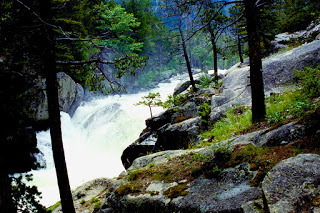 John Burroughs wanted people to go outside and enjoy the nature that existed around them wherever they lived, whether this was farmland, forest, ocean, desert, or a city park. He was concerned that people were staying indoors too much.
John Burroughs wanted people to go outside and enjoy the nature that existed around them wherever they lived, whether this was farmland, forest, ocean, desert, or a city park. He was concerned that people were staying indoors too much. He wrote this in the late 1800s.
I think he’d be more concerned today, because we drive, rather than walk, to the local grocery, if we still have a local grocery. New housing developments often don’t have sidewalks. Most of our houses don’t have porches for sitting and chatting with neighbors walking by. We don’t linger after dinner to watch the sun set over the trees, or see the moon rise. Our children don’t go outside to play, and many are afraid of being alone in the woods.
Nature as the backdrop for our activities.We use the outdoors as a place for getting exercise — hiking, riding bikes, canoeing, playing baseball, soccer, golf, or skiing. Most of us need the exercise, so this is good, but we often neglect to pause in our activities and observe what nature is doing around us. Were there deer present, or a stream? What color were the birds?
Nature as scienceSome of us like to spend hours figuring out how nature works. We look at it analytically, pulling out guide books to identify trees, plants, and birds. We pick up rocks and try to decide if the glaciers left them. We take measurements of air and water to record matters dealing with global warming, mega-farm pollution, the effects of fracking, and the disappearance of the bees. We view nature is a living laboratory.
Nature as therapyNature is a place where we go to get away, unwind, relax. We feel renewed by the fresh air, the unhurried pace, and the quietness of the outdoors. We let our minds wander where they want, reclaim forgotten dreams, and discover insights. When we return home, we are energized.
Nature as inspirationIn places like our national parks, preserved because of their outstanding scenery, we are inspired by the dramatic beauty and the diversity of life to take the next step in our lives. We’re fill with ideas. Sometimes we see lightning flash off the tops of mountains during thunderstorms, and tiny trout swim under the ice in the river.
Nature as spiritualSome of us feel spiritual outdoors, as if we were seeing the untouched remnants of Creation. We’re aware of a greater power around us, and sometimes we feel awe. We look for transcendence outside because we need to be reminded that we are part of something greater than our individual, city-bound lives.
Nature as relationshipWe can develop a relationship with nature through any of these activities. We can also make having a relationship with nature the focus of our being outside, rising with the sun and going to bed when it sets. We interact with each season differently, and treat nature as a friend instead of an adversary. It was only after John Muir forgot his plant press one day that he was forced to look at Yosemite as a whole, and felt a personal connection that he nurtured for the rest of his life.
The journey into nature is also a journey inside. Go into nature and discover who you are.
When we let ourselves love nature, we care what happens to it.
Published on February 21, 2016 07:19



